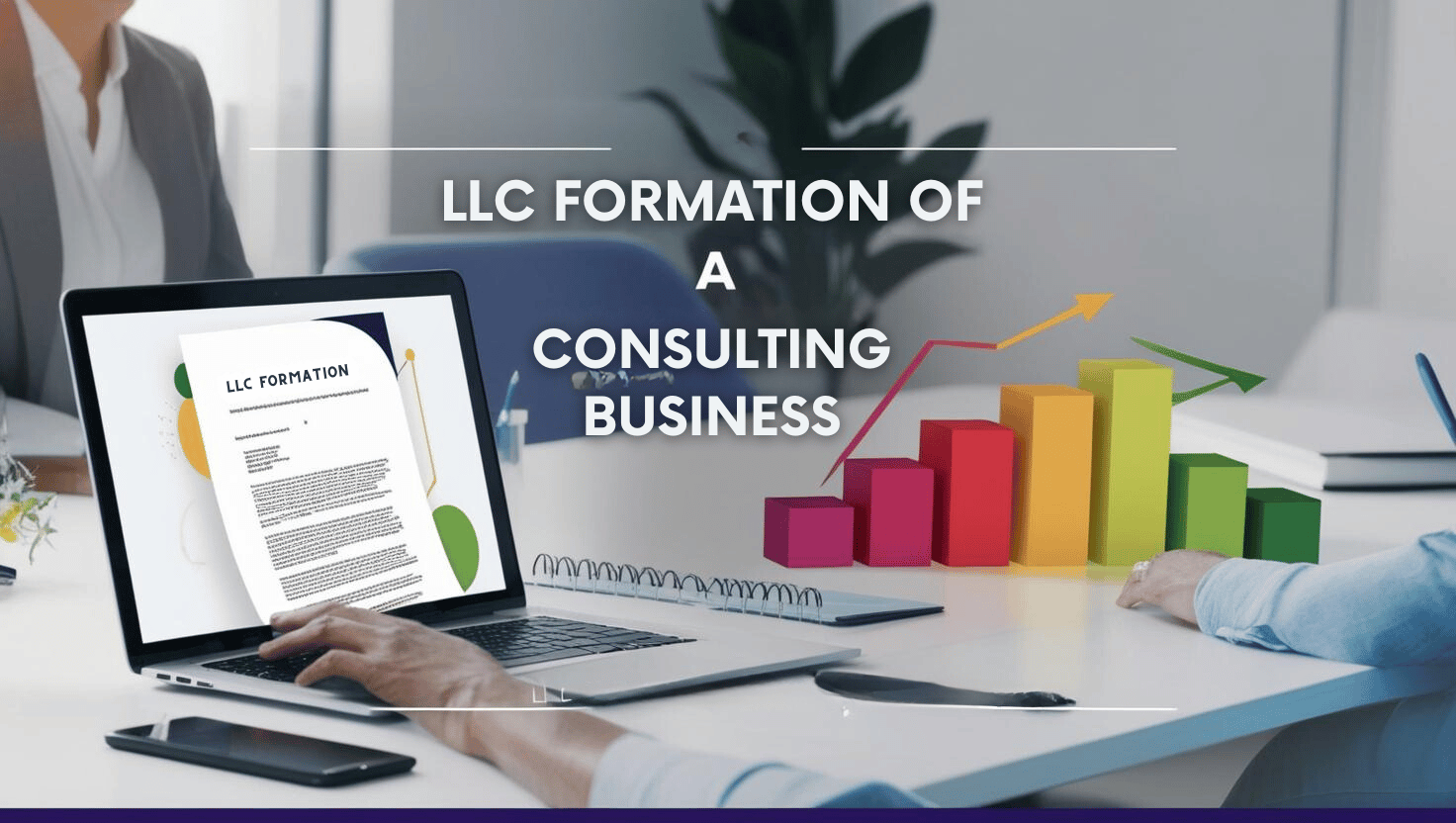Getting an LLC for a consulting business is a legal and financial decision, as it helps you create a company structure and safeguards your investments. Clients are more likely to trust you as a professional with an LLC because it protects your assets, offers benefits at tax time, and presents the business in a favorable light.
Thanks to the management experience and the business understanding you have, you may launch a brand new consulting business or expand an already existing one. However, if you are going down that route, make sure you know how to set up an LLC, as this will ensure that you follow all the procedures and achieve your long-term goals.
Consulting includes a variety of specialties, including but not limited to, assistance with business strategies, IT aid, personal coaching, and creative service styles. Consulting entails assisting customers with advice in certain fields, so that a problem is solved or some goal is reached, hence making an organization or a firm more productive.
In doing so, an LLC will not just protect your assets from losses but at the same time ready your enterprise for further development in stability.
We understand that you may be unfamiliar with certain processes and would like to assist by going over the steps that need to be taken to establish an LLC in your specific line of work.
Step 1: Choose a Name for Your LLC
It is essential to follow the rules set in your state of choosing an appropriate name for your LLC. In most cases, this is a requirement for the title to:
- Be different from all the other business registered titles.
- Take up phrases such as Limited Liability Company, or the short form “LLC” or “L.L.C.”
- Completely ban the use of words like “bank” Or “insurance” unless expressly allowed the use of such words.
To search for a name, check with the business register of your state. Deadweight trademarks are also wise to avoid and grab appropriate domain names for your site. That’s why a little time in this practice gives significance to your brand and the focus of your consultancy business.
Step 2: Designate a Registered Agent
An agent must be appointed who will collect both legal documents and other communication on your LLC. It has to be:
- A resident residing in the state of your LLC´s syndication or a firm that is verified for providing registered agent facilities.
- Having a physical address (use of P.O. Boxes is unsatisfactory)
In order to stay in compliance and maintain privacy, most business owners hire companies that offer professional registered agent services.
And thanks to having a registered agent, you can concentrate on every detail of your consulting firm without having to keep track of critical deadlines or legal documents, you also never have to worry about losing legal notices.
Step 3: File Articles of Organization
In most states, one will refer to the article of organization as a certificate of formation. Usually, this is the certificate that shows the establishment of an LLC. This filing generally consists of:
- The official name and address of the LLC.
- The official name and address of the person acting as the registered agent of the LLC.
- The reason why the company is set up (which can either be a general reason or a specific one).
- The way the organization is going to be managed, for instance, member-managed or manager-managed.
Make sure to send this form to your state’s business filing office, who in most cases is the Secretary of State, and pay the filing fee. For filing with some states it may be possible to do so on the internet which simplifies and speeds up the whole process.
Step 4: Create an LLC Operating Agreement
An operating agreement details how an LLC will be structured and controlled. In some cases, states may not always require it, but it is very important for the following reasons:
- Excluding or identifying the duties of members or managers.
- Determining the share of profits, manner of business decisions, and the way issues will be resolved.
- Safeguarding the limited liability status.
This document is very critical in the case where there are several members in the consulting business in particular. It complements the internal mechanism of governance and thereby helps to resolve future issues by reducing the chances of conflict or misunderstanding.
Step 5: Apply for an EIN (Employer Identification Number)
An EIN is a tax number that is issued to a business by the IRS in the United States. It is comparable to the social security number for an individual. It is mandatory to:
- Open a bank account in the name of the business.
- Hire staff.
- Submit returns to the state and federal government.
It is free to get an EIN application off the IRS page. Unless you intend to employ workers, you should still obtain an EIN because it adds authority up a notch and makes the task of filing your taxes straightforward.
Step 6: Open a Company Bank Account
A business bank account should be opened so that your personal and business transactions are conducted independently. This stage is important for:
- Making accounting, especially tax filings and returns, less cumbersome.
- Creating a protective wall around personal assets.
- Building trust with customers vendors and other stakeholders.
Select a bank that has experience in working with small businesses that mostly rely on consulting services. Things like low cost, mobile banking features, provisions for link-up with accounting apps, and the rest would be useful.
Step 7: Obtain Necessary Permits and Licenses
A range of licenses or permits may be needed to operate a consulting business depending on your region and the type of consultancy services you offer. Check:
- License and permit requirements for your state or region.
- Professional designations within the industry that you serve that could add to your professional standing.
Certain countries or certain regions within a country might require an all-purpose business permit. In those states, if your business in consultancy focuses on a regulated area (consulting in finance, legal matters, health, etc.), there is a need to have specific licenses or certificates to practice that business legally.
Step 8: Draft a Business Plan
Creating a business plan is not a legal requirement but it can serve as a very insightful planning tool for your consulting business. Your plan should have the following sections:
- Business Overview: highlight, what will be your focus area, who will you sell to and how will you differentiate from the competition.
- Market Analysis: Scope and competition in the area of business you are operating and the competitors you will have to deal with.
- Marketing Strategy: how the company will get customers and how will it retain them.
- Financial Projections: Show the projected cash inflows, expenditures, and profitability levels.
In case your business interests include seeking partnerships or getting funding, the business plan is a prerequisite.
Step 9: Continue to be Compliant
After establishing the LLC, the following actions will help in sustaining its status:
- Complete Form 5472 every year.
- Fulfill state obligations.
- Document transactions and other operational aspects of the company.
- Reapply for required licenses and permits.
It is recommended that owners of an LLC remain updated on the laws and regulations that vary from state to state. This way they integrate systems and processes to manage such dependencies. Many set up alerts for themselves and for such restrictions, many owners use compliance services.
Benefits of Forming an LLC for a Consulting Business
✅ Limited Liability Protection: Primarily, it protects your properties if the business gets sued for debts or obligations incurred while operating.
✅ Tax Flexibility: LLCs have multiple options available when it comes to taxation, they can be taxed as a sole proprietorship, partnership firm, or as corporation. This enables one to make the best tax strategy for consulting income.
✅ Professional Credibility: With an LLC, your clients shall have more trust in you and it also improves your professional image. Sometimes, clients are more comfortable dealing with a formally registered business than someone self-employed.
✅ Simplicity: LLCs have lesser formality requirements than corporations, which makes them easier to run.
✅ Scalability: An LLC structure permits growth and the addition of members (or changing to a different taxation structure) as the size of the consulting business increases.
Common Mistakes to Avoid
Now let’s discuss some common mistakes one must avoid when starting an LLC for your consulting business.
✅ Skipping the Operating Agreement: While it is not compulsory, not having an operating agreement can potentially cause disputes between different members of an LLC or cause a legal standoff.
✅ Mixing Personal and Business Finances: Failing to separate finances can jeopardize your limited liability protection.
✅ Ignoring Compliance Requirements: Missing filing due dates or forgetting to fulfill the state’s requirements can cause punishment or dissolution of the LLC.
✅ Choosing the Wrong State: Choosing a state with relatively easy rules and no tax requirements puts you at an advantage as it saves costs.
Final Thoughts
Establishing an LLC for your consulting business is a wise decision because it not only allows you to safeguard your assets and give your business a more professional appeal but also promotes your business in the state and federal markets.
Also, a well-formed LLC would make your clients have more faith in you, and your services stand out amongst competitors.
Lastly, if you have no idea where to start then you can use EasyFiling or any similar service which will set up your LLC for you. Book a free consultation today with Easyfiling to get started.
Frequently Asked Questions (FAQs)
Why should I form an LLC for my consulting business?
Creating an LLC prevents personal assets from being seized due to business responsibilities, gives room for taxes to be handled differently, and enhances the relative status. Hence, it is a straightforward way of giving your consulting business a legal and fiscal framework.
How much does it cost to form an LLC for a consulting business?
The expenses vary depending on the state however they usually range from Range of $50 to $500, this will include Organizational Articles filing fees, and perhaps yearly report fees among other charges such as business licenses and registered agent services.
Do I need a business license to operate as a consultant?
Some areas require a general business license, others require certificates however because there is a wide variety of services being offered by consultants, industry and state requirements should be consulted to avoid any complications.
Can I operate my consulting business from home as an LLC?
Most don’t go through the hustle of paperwork and instead run their consulting firm right from their house, this allows for a greater degree of ease; however, a firm might need to check local zoning laws and regulations of the state.
Do I need to apply for an EIN if I am the sole owner of my business?
As a single-member LLC, you will find it useful to get an EIN for tax submission, the accounts, and when seeking to employ staff. It will also enhance the level of professionalism while also streamlining the tax reporting process.
File Your LLC Today
25$ off with a coupon
Lock in EasyFiling's transparent rates and get lifetime compliance support at no extra cost.
Get Started Now






